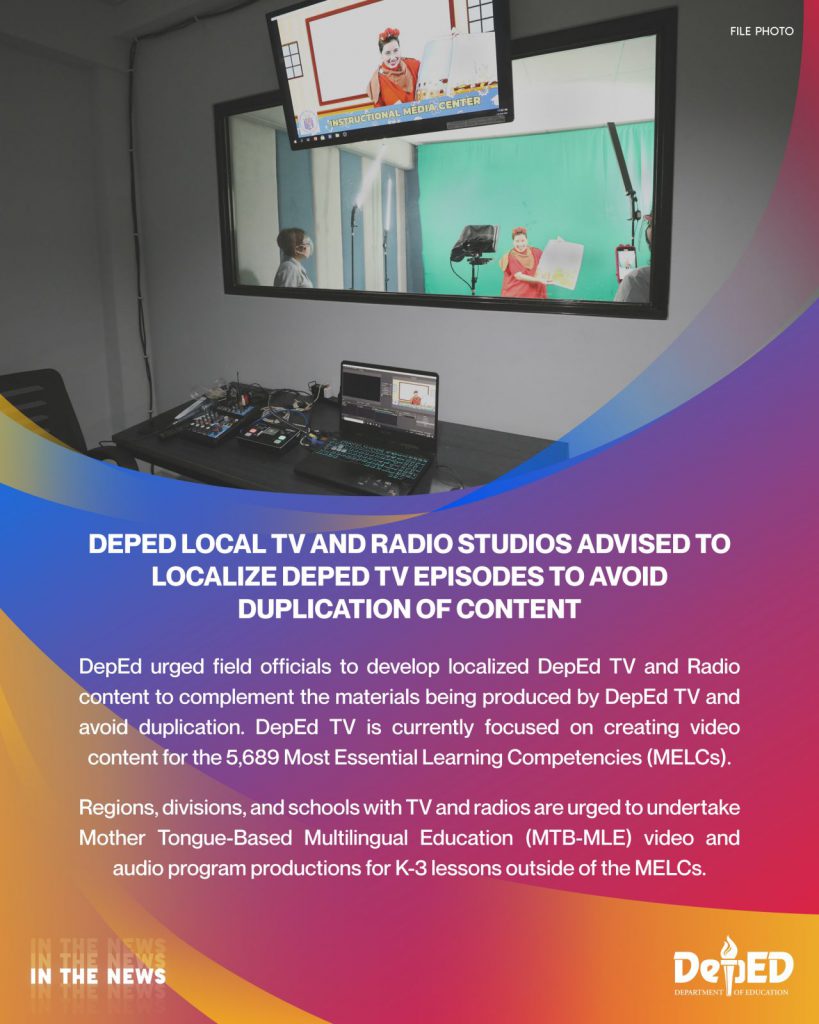 |
March 28, 2021 – To expand the accessibility of various TV- and radio-based instructions, the Department of Education (DepEd) urged field officials to develop localized DepEd TV and Radio content to avoid duplication of materials.
“Let us not reinvent the wheel, let us not also duplicate efforts already made. Kapag nakagawa na ang DepEd TV ng episode, huwag nang gumawa ang regional offices. Sayang ang panahon, sayang ang effort, at sayang ang pera,” Undersecretary for Administration Alain Del Pascua said.
Pascua emphasized the importance of tackling new topics and distributing video instructions for DepEd TV in all of the regions.
Presently, DepEd TV is concentrating on creating video content for the 5,689 Most Essential Learning Competencies (MELCs).
The MELCs are based on the K to 12 curricula and had been streamlined to 5,689 from the original 14,171. The 60% reduction is part of the Department’s Basic Education Learning Continuity Plan (BE-LCP) in response to the COVID-19 pandemic.
“Outside of the MELCs, pwedeng mag-concentrate ang ibang division at eskwelahan. Ito ay magkaiba sa gagawin ng DepEd TV. Actually, magiging complimentary at support ito [sa distance learning],” he said.
Usec. Pascua also called upon all regions, divisions, and schools with TV and radios to undertake Mother Tongue-Based Multilingual Education (MTB-MLE) video and audio productions for K-3 lessons as this matter cannot be undertaken by DepEd TV at the moment.
“The Central Office-led DepEd TV uses mainly English and Filipino languages in its episodes. All MTB-MLE videos must be produced at the local levels at this time. They can be made with new productions or the DepEd TV episodes may be dubbed using the local language,” Pascua said.
“Explore ‘yung hindi mako-cover ng DepEd TV at DepEd Radio para sa ganoon, ‘yung mga output ninyo, video man ‘yan or radio, mapapakinabangan pa rin at puwede nating i-upload sa DepEd Commons at DepEd TV YouTube Channel upang magamit ng mas maraming learners,” he added.
During the recent launch of Instructional Media Centers (IMCs) by the Schools Division Office of Pasig City, Usec. Pascua emphasized that with the collective initiatives of DepEd Commons, DepEd TV, and DepEd Radio “magiging kahanga-hanga ang mga divisions, mga regions, pati na rin ang mga eskuwelahan,” he said.
DepEd TV, the main television-based instruction initiative of the Department, has produced 1,981 episodes from the first quarter to the third quarter of School Year 2020-2021.
During the first day of the virtual In-Service Training or INSET on March 15, DepEd-ICT Service director Abram Abanil said the Department is still ramping up the production of episodes to cover all of the learning competencies in each school subject in the basic education curriculum.
“One of the major programs that we have been developing is the DepEd TV, where we have been producing around 130 episodes per week,” Abanil said.
“[Thus], we can air on television these episodes so the youth can still learn even if they don’t have face-to-face classes,” he said.
The DepEd TV team has also turned over an approved broadcaster training program and design that is available upon request by school division offices (SDOs) who intend to have their localized DepEd TV programs. The team has already trained 200 teacher-broadcasters and produced 640 fully edited, mastered, and formatted broadcast-ready TV lessons, as well as turned over of 25 audio-video lessons by broadcast veterans and complete operations manual for broadcast TV.
These efforts were recently recognized by the Mobiles of Education (mEducation) Alliance as the Department was cited as one of the Policymaker EdTech Champions and DepEd TV as one of the honorable mentions under the Crisis and Conflict Response category.
DepEd TV and DepEd Radio are projects spearheaded by the Information and Communications Technology Service-Education Technology Unit (ICTS-EdTech) headed by Director Abram Y.C. Abanil, under the Administration Strand led by Undersecretary Pascua and Assistant Secretary Salvador Malana III. It is part of the Public Schools of the Future (PSOF) Framework of the Administration Strand under the leadership of Secretary Leonor Magtolis Briones and from direct instruction from Usec. Pascua as a continuation and follow through of SIPAG (Strand Interface for Programs and Guidelines.)
END


